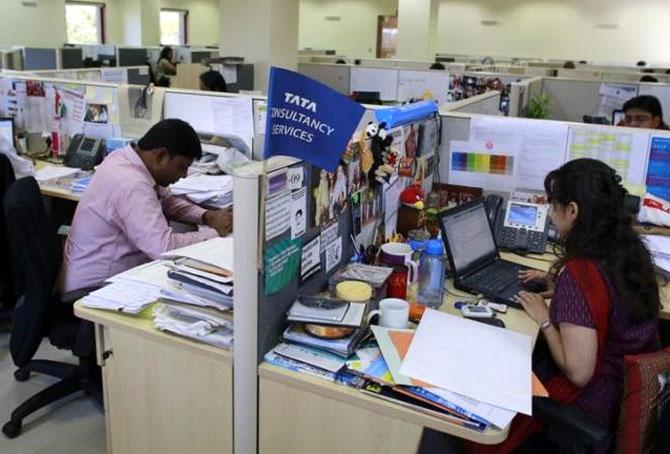Most of the large mid-caps share similar business model as the large-caps and have more of less similar set of clients.
 After the top three IT players - Tata Consultancy Services (TCS), Cognizant and Infosys - sounding off warning bells on second-quarter and full-year growth performance, analyst predict that mid-cap players will be worse off.
After the top three IT players - Tata Consultancy Services (TCS), Cognizant and Infosys - sounding off warning bells on second-quarter and full-year growth performance, analyst predict that mid-cap players will be worse off.
Most of the large mid-caps, such as L&T Infotech, Hexaware, Mindtree, and MphasiS, share similar business model as the large-caps and have more of less a similar set of clients.
Hence a warning by the three large players will not augur well for mid-caps.
Bangalore-based Mindtree earlier this month lowered its sequential quarter revenue guidance.
The company said that Q2 revenue decline is expected due to cross-currency movements, project cancellations and slower ramp-ups in a few large clients across different verticals and continued weakness in its UK-based subsidiary Bluefin.
This was the second such warning from the company. For the quarter ended March 31, 2016 the company too had raised warning however, it then had surprised the street with better numbers.
Analyst feel that mid-cap firms with a services focus are similar to large cap in terms of strategy and pie for market share, hence dip in large cap business momentum impact the latter too.
“All of those firms will be under pressure who have exposure to the BFSI sector and have a similar business model as the large-cap such as L&T Infotech, Hexaware, Mindtree and others. Unless a player has a differentiation aspect or a product play, the mid-cap segment will be squeezed hard,” said an analyst from a leading brokerage firm.
The other reason for the mid-cap firms to be hit hard due to the uncertainty in the macro environment is client concentration.
Almost 45-55 per cent of revenue is contributed by top 10 client and if one of the clients either moves out due to consolidation of vendor or does not ramp-up, it has an immediate impact.
Other than this several of the mid-cap firms are dealing with their own internal issues which is impacting the growth trajectory.
For instance, Pune-based KPIT Technologies had said that the first half of FY17 will see flat topline and profit growth.
The company said this was due to internal restructuring as well as external changes in the business environment.
"The company's traditional revenue from ERP (Enterprise resource planning) implementations are affected more than anticipated earlier, whereas there is good traction in the newer areas of cloud and digital technologies. As a result, the company expects a 4 per cent revenue drop for the Q1 with a consequent drop in profitability. We anticipate the revenues and profits to be flattish in the Q2 over the Q1," said the company in an earlier statement.
Similarly, Pune-based Persistent Systems is also undergoing restructuring wherein it is moving away from contracts that are not strategic in nature.
Company officials said that they have moved out of 20 contracts because of this rejig.
"We want to work with our strategic clients. We thought ending 20 odd non-strategic contracts would be better for us. We think that the Q2 and the Q3 will not see any dramatic change, but the Q4 onwards we see good traction," said Mritunjay Singh, executive director & president of Services at Persistent Systems.
However, there is silver lining for the mid-cap IT space, especially for those firms that have a product play.
Players like Oracle Financial Services Software, Intellect Design Arena, NIIT Tech, Majesco are some of the companies that may not be as impacted, as their business is driven by products rather than services.
Even to some extent Persistent Systems which has been increasing its focus on the IP business.
Photograph: Reuters






